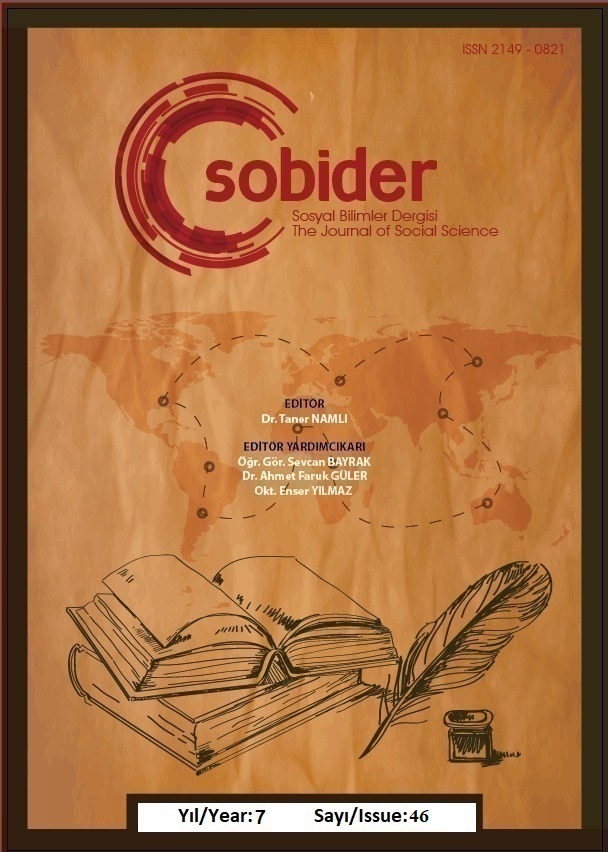Author :
Abstract
Tanzimat döneminin yeniliğe temkinli yaklaşan kalemlerinden Muallim Naci [ö.1893], Tercüman-ı Hakikat gazetesine gönderdiği on dört adet edebî mektubu ve gazeteden kendisine gelen cevapları 1884 yılında Yazmış Bulundum adıyla yayınlar. Edebiyata hevesli gençlerin yetiştirilmesi ve yönlendirilmesinde faydalı olacağı kanaatiyle paylaşılan bu yazışmalar, Türk edebiyatındaki "tenkit" anlayışını ve bir edebî tür olarak "mektup" yazınının gelişimini yansıtması açısından dikkate değerdir. Yazmış Bulundum, Naci ve döneminin edebî zevk ve tutumuna dair önemli bilgi ve bulguları da ihtiva etmektedir. Dilde sadeleşme eğiliminin Tanzimat dönemindeki köklerine ışık tutan, Türk edebiyatında modernite ile gelenek arasındaki sınırın nasıl başladığını gösteren eserlerden biri olan Yazmış Bulundum, eski ile yeni arasında âdeta bir geçiş dönemi şairi olan Naci'nin edebî hüviyetinde yaşadığı düaliteyi göstermesi açısından da ilginçtir. "Eski"nin güzeline bile yüz çevrilen bu dönemde sade, açık, akıcı bir dil ve üslubun hâkim olacağı "yeni"nin itibar görüp yaygınlaşması büyük bir heyecan ve arzu ile beklenmektedir. "Mesud-ı Harabati" mahlasıyla gazeller, rubailer yazan Naci ise nazmından ziyade nesriyle Osmanlı edebiyatının bu yeni yeni oluşmaya başlayan çehresine uygun düşmekte ve rağbet görmektedir. "Yeni"nin akıntısına kapılmak isterken "eski"yi de bir türlü bırakamayan Naci, tam anlamıyla araftaki şairdir. Bu makalede Naci'nin Yazmış Bulundum adlı eseri ele alınmış ve eser Latin harflerine aktarılmıştır.
Keywords
Abstract
Muallim Naci [d.1893], who is cautious about the innovation of the Tanzimat period, publishes fourteen literary letters he sent to the Tercüman-ı Hakikat newspaper and the answers he received from him in 1884 under the name of Yazmış Bulundum. These correspondence, shared with the belief that it will be useful in raising and directing young people who are enthusiastic to literature, is remarkable in terms of reflecting the "criticism" understanding in Turkish literature and the development of the "letter" writing as a literary genre. Yazmış Bulundum also contains important information and findings regarding the literary taste and attitude of Naci and his period. Yazmış Bulundum, one of the works that sheds light on the roots of the simplification tendency in the Tanzimat era and shows how the border between modernity and tradition started in Turkish literature, is also interesting in terms of showing the literacy of Naci, who is a poet of the transition between old and new. It is expected with a great excitement and desire that the "new", which will be dominated by a plain, open, fluent language and style, will be respected and widespread in this period, which is confronted even with the beauty of the "old". Naci, who writes ghazals and rubais with the pseudonym "Mesud-ı Harabati", is in line with this new-emerging face of Ottoman literature rather than his verse and is in demand. Naci, who cannot leave the "old" while trying to fall under the stream of "New", is a literal poet. In this article, Naci's work named Yazmış Bulundum is discussed and the work is transferred to Latin letters.
Keywords
- Bahâî (T.Y.). El-Keşkül: I. Cüz. Beyrut: Müessesetü'l-A'lemi li'l-Matbuat. (https://www.noorlib.ir/view/ar/book/bookview/text/6302/1/89 , http://www.nosokhan.com/Library/Topic/0HWT) (Son Erişim Tarihi: 01.06.2020).
- Hafız-ı Şirazî (2016). Hafız Dîvânı. (Çev. Abdülbâki Gölpınarlı). İstanbul: İş Bankası Kültür Yayınları.
- Hafız-ı Şirâzi (2011). Hafız Divanı 1. (Çev. Mehmet Kanar). İstanbul: Ayrıntı Yayınları.
- Mevlânâ Celâleddîn-i Rûmî (2006). Mesnevî-i Şerîf Şerhi 6. (Çev. – Şerh. Ahmet Avni Konuk). İstanbul: Kitabevi Yayınları.
- Parla, Jale (2016). Babalar ve Oğullar: Tanzimat Romanının Epistemolojik Temelleri. İstanbul: İletişim Yayınları.
- Saib-i Tebrizi (T.Y.), “Dîvân-ı Eşâr: Gazeliyat”, https://ganjoor.net/saeb/divan- saeb/ghazalkasa/sh2613/ (Son Erişim Tarihi: 01.06.2020).
- Sünbülzâde Vehbî (2017). Sünbülzâde Vehbî Dîvânı. (Haz. Ahmet Yenikale). Ankara: T.C. Kültür ve Turizm Bakanlığı Yayınları. https://ekitap.ktb.gov.tr/Eklenti/56212,sunbulzade-vehbi-divanipdf.pdf?0
- Tanpınar, Ahmet Hamdi (1977). Edebiyat Üzerine Makaleler. (Haz. Zeynep Kerman). İstanbul: Dergâh Yayınları.
- Ünlü, Osman (2006). "Türk Edebiyatında Saib-i Tebrizî Şerhleri", Celal Bayar Üniversitesi Sosyal Bilimler Dergisi: Manisa 2006, 4. C., 1. S., 85-93. s. “Abûs-ı zühd be vech-i humâr nenşîned/ Murîd-i hırka-i dordîkeşân-i hoşhûyem" - Zahitliğin asık suratı şarap içenlerin yüzünde yoktur, iyi huylu sarhoşların müridiyim. (Hafız-ı Şirazî, 2016: 313, Hafız-ı Şirâzi 2011).





